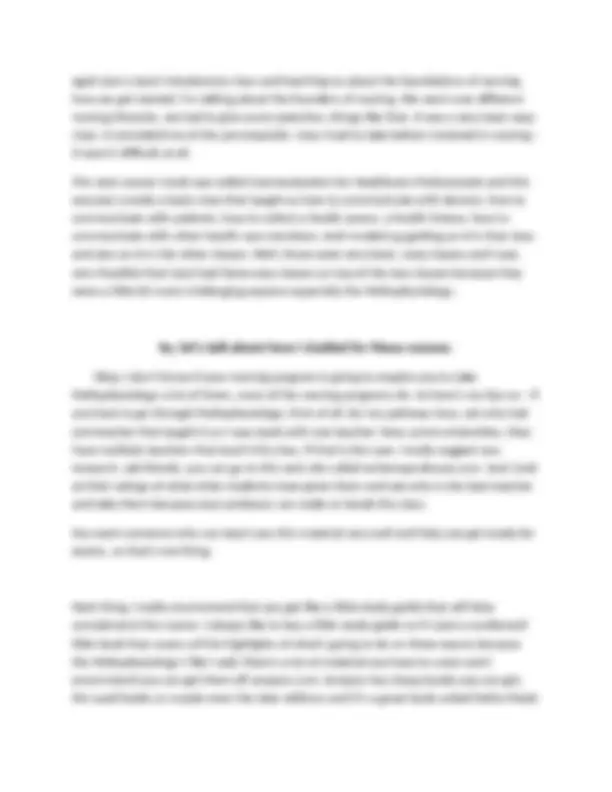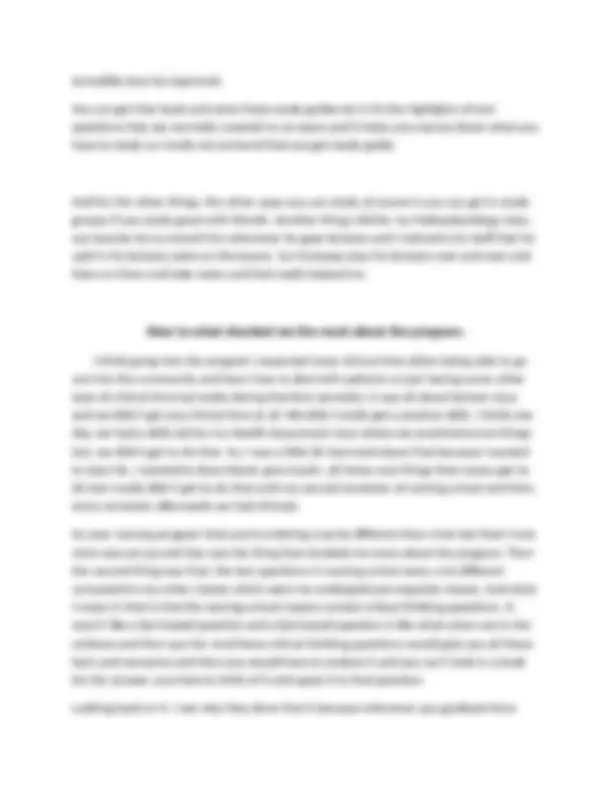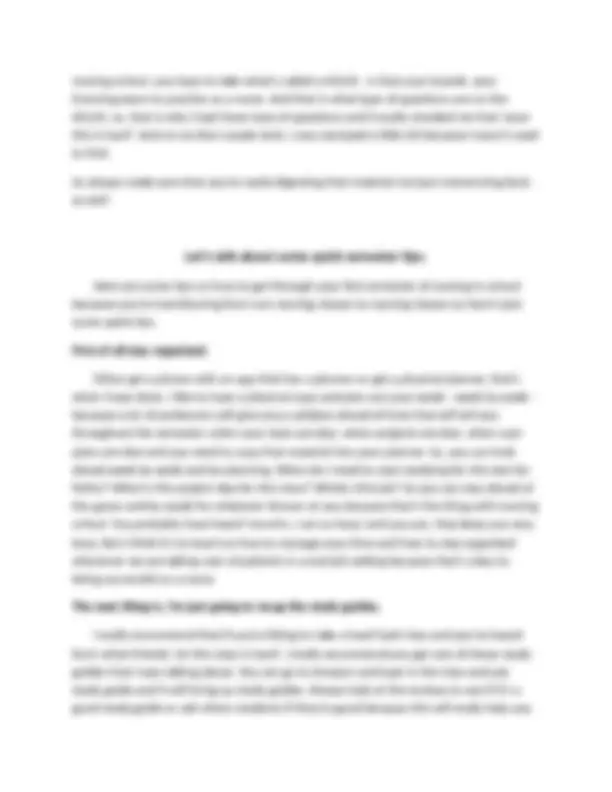





Study with the several resources on Docsity

Earn points by helping other students or get them with a premium plan


Prepare for your exams
Study with the several resources on Docsity

Earn points to download
Earn points by helping other students or get them with a premium plan
Community
Ask the community for help and clear up your study doubts
Discover the best universities in your country according to Docsity users
Free resources
Download our free guides on studying techniques, anxiety management strategies, and thesis advice from Docsity tutors
This document shares what to expect in the first semester of nursing school and what it is like. I discussed on the tips on how to pass your first semester, my experience on my first semester, the grades I had, and how to study throughout the first semester of nursing school.
Typology: Schemes and Mind Maps
1 / 7

This page cannot be seen from the preview
Don't miss anything!




Today, I want to make a article for you students who may be entering in the first semester of nursing school. So you have finally made it to nursing school, you have jumped through all those hoops they made you jump through, you've went through interviews, you've completed a progressive quick courses, you've completed entrance exams and finally you are starting your first semester of nursing school. You're excited, a little scared and you're reading this article because you want to know what to expect. So in this article I want to go over some things you could expect. What I'm going to cover are;
I was in class from Monday through Friday so I had lecture courses during all that time. And on Mondays, Wednesdays and Fridays I had a class called Pathophysiology.
Then, also later on in the day on Mondays, Wednesdays and Fridays I had a class called Health Assessment. On Tuesdays and Thursdays I had a class called Intro To The Nursing Profession and on Thursdays and Tuesdays and Thursdays, I also had a class called Communications For Healthcare Professionals.
Okay out of all these classes right here, the hardest class of all was Pathophysiology. I heard from other students that Pathophysiology was hard. Pathophysiology is sort of like Anatomy and Physiology. I don't know if you had to take Anatomy and Physiology in that you cover so much material and you're required to know a lot of material for one exam. But Patho. takes a little set further, it goes over complex diseases and a little bit of Microbiology. And you have to know the critical thinking behind that because up till then I was just taking courses that had exams that were really fact-based courses. But in Pathophysiology , they gave you signs and symptoms of diseases and you have to analyze that and decide what it's causing it and that's I think what made it so difficult. Awesome as aside, my professor that I had made the course a little bit more difficult too. But typically, students have problems with Pathophysiology and I'm going to give you some study tips for that class here in a second but I ended up actually - believe it or not - getting an 'A-'. Here's the catch, the reason I got an 'A-' was because there was extra credit involved in the semester and without the extra credit, I probably would have gotten a 'C' or a 'B'. It was a really big project we had to do so I ended up getting an 'A-'. Okay, the next course I had to take was called Health Assessment. This was it's a basic introductory class for nurses where you are learning the body from head to toe, how to do a health assessment on a patient. You cover everything from assessing the ears, the eyes to pelvic exams to abdominal exams. It was just a great class to learn what a nurse does and I found that class very interesting and actually enjoyed it but I ended up scoring a 'B+' which is a great grade. I'm happy with the B+ but I probably could have done a little bit better if I wasn't having to study so much for Pathophysiology and complete the extra credit courses because this class took a lot of my time compared to Health Assessment. Okay, the next class I took was called Intro To The Nursing Profession. This class was
Incredibly Easy by Lippincott. You can get that book and what these study guides do is hit the highlights of test questions that are normally covered on an exam and it helps you narrow down what you have to study so I really recommend that you get study guide. And for the other things, the other ways you can study of course is you can get in study groups if you study great with friends. Another thing I did for my Pathophysiology class, our teacher let us record him whenever he gave lectures and I noticed a lot stuff that he said in his lectures were on the exams. So I'd always play his lectures over and over and listen to them and take notes and that really helped me.
I think going into the program I expected more clinical time either being able to go out into the community and learn how to deal with patients or just having some other type of clinical time but really during that first semester, it was all about lecture class and we didn't get any clinical time at all. We didn't really get a practice skills. I think one day, we had a skills lab for my Health Assessment class where we practiced some things but, we didn't get to do that. So, I was a little bit bummed about that because I wanted to start IVs, I wanted to draw blood, give insulin, all those cool things that nurses get to do but I really didn't get to do that until my second semester of nursing school and then, every semester afterwards we had clinicals. So your nursing program that you're entering may be different than mine but that's how mine was set up and that was the thing that shocked me most about the program. Then the second thing was that, the test questions in nursing school were a lot different compared to my other classes which were my undergrad pre-requisite classes. And what I mean in that is that the nursing school classes contain critical thinking questions. It wasn't like a fact-based question and a fact-based question is like what colors are in the rainbow and then you list. And these critical thinking questions would give you all these facts and scenarios and then you would have to analyze it and you can't look in a book for the answer, you have to think of it and apply it to that question. Looking back on it, I see why they done that is because whenever you graduate from
nursing school, you have to take what's called a NCLEX - is that your boards, your licensing exam to practice as a nurse. And that is what type of questions are on the NCLEX, so, that is why I had those type of questions and it really shocked me that 'wow this is hard'. And on my first couple tests, I was stumped a little bit because I wasn't used to that. So always make sure that you're really digesting that material not just memorizing facts as well.
Here are some tips on how to get through your first semester of nursing in school because you're transitioning from non nursing classes to nursing classes so here's just some quick tips. First of all stay organized. Either get a phone with an app that has a planner or get a physical planner, that's what I have done, I like to have a physical copy and plan out your week - week by week - because a lot of professors will give you a syllabus ahead of time that will tell you throughout the semester, when your tests are due, when projects are due, when care plans are due and you need to copy that material into your planner. So, you can look ahead week by week and be planning. When do I need to start studying for this test for Patho? When's this project due for this class? Winter clinicals? So you can stay ahead of the game and be ready for whatever thrown at you because that's the thing with nursing school. You probably have heard 'me-ehn, I am so busy' and you are, they keep you very busy. But I think it's to teach us how to manage your time and how to stay organized whenever we are taking care of patients in a real job setting because that's a key to being successful as a nurse. The next thing is, I'm just going to recap the study guides. I really recommend that if you're fixing to take a hard hard class and you've heard from other friends 'oh this class is hard', I really recommend you get one of those study guides that I was talking about. You can go to Amazon and type in the class and put study guide and it will bring up study guides. Always look at the reviews to see if it's a good study guide or ask others students if they're good because this will really help you
that whenever I was a student. I remember thinking, 'me-ehn, I never want to go back to school' but at times I do miss it. But enjoy it, have fun and make the most of it. So, that was some quick tips on the first semester of nursing school, my experience with it and I wish you the best of luck in your first semester of nursing school. I hope you enjoy it and I know you're excited to be a nurse. Thanks for reading.